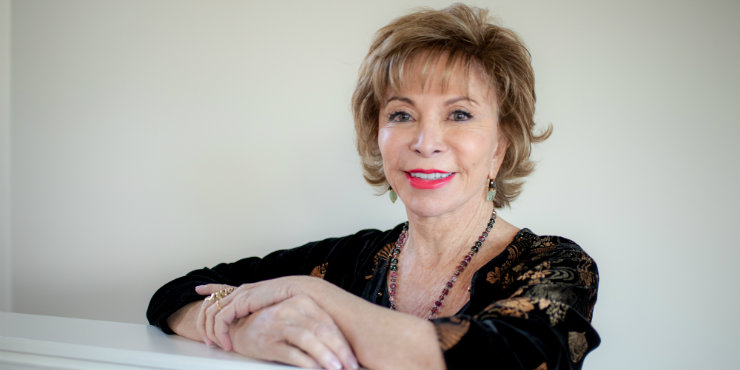
Isabel Allende. Image © Lori Barra
Isabel Allende is a Chilean writer who, having sold more than 74 million books translated into 42 languages, is considered to be the world’s most widely-read Spanish-language author. Her imaginative historical fiction novels include The House of the Spirits, City of the Beasts and the newly-published A Long Petal of the Sea.
Isabel lives in California and is the recipient of numerous prizes including the Presidential Medal of Freedom (awarded in 2014) and the 2018 Medal for Distinguished Contribution to American Letters from the National Book Foundation.
Isabel is making her first visit to the UK in 12 years next month, giving her many readers a rare chance to see her in person at the Royal Festival Hall on Sunday 9 February and the UEA Literature Festival on Wednesday 12 February.
1. Who were your literary heroes and influences as you were growing up?
My heroes were never the damsels in distress, they were guys like Michael Strogoff (The Courier of the Czar, Jules Verne) or Andrew Bolkonski (War and Peace, Leo Tolstoy). They were brave, they suffered, sometimes they died for their ideals. Actually, I named my son Nicolas after a character in a book by Henri Troyat, a young man who gives his life to save the older woman he loves.
Those characters and many, many others (I was a compulsive reader) stayed in my heart and I am sure have influenced my writing.
2. When did you first start writing and realise that you had a talent for storytelling?
I started writing as a journalist when I was in my twenties but I never dreamed I would become a writer. I wrote my first novel, The House of the Spirits, when I was almost forty years old.
According to my mother, I started telling stories to my brothers and other children as soon as I learned to read (around 5-6 years old). I would get an idea from a book and change it completely to create my own plot. Often the same characters would come back in other stories. However, that was never considered “a talent for storytelling”; no one ever suggested that I could be a writer. In my generation and in my family women were not encouraged to be creative or have a career.
3. We’re all eagerly waiting for your new book A Long Petal of the Sea. Can you tell us a little about it before we get to read it?
The story begins in January 1939, at the end of the Civil War in Spain, when half a million people crossed the border into France escaping from Franco’s armies and ended up in improvised concentration camps, where thousands died. In Chile, the poet Pablo Neruda convinced the government to receive some Spanish refugees. He went to France, raised the money to buy a ship called Winnipeg, conditioned it to transport two thousand passengers, selected the people and sent them to Chile.
This is the story of a couple who traveled in the Winnipeg, their ordeal in Spain and France, their new lives in Chile and how they had to go into a second exile 33 years later, when a military coup toppled the democratic government and replaced it with a long a brutal dictatorship.
The model for my protagonist, Victor Dalmau, was a friend of mine called Victor Pey. He survived the Civil War, travelled in the Winnipeg, and made a new life in Chile until he was arrested by the dictatorship in 1973 and eventually found refuge in Venezuela, where we met. A Long Petal of the Sea is a story of war, displacement and losses, but it is mostly a long love story.
4. Your books feature several inspiring women. How has life changed for you as a woman writer since you first started writing?
When I wrote my first novel I was going through very hard times. I was a middle-aged woman in a failing marriage, working in a boring job, with adolescent children who no longer needed the full attention of a mother. I felt that my life was a failure.
The unexpected success of my novel changed my life. It gave me a voice when I was silent. It gave me wings when I was stuck. It gave me resources when I was struggling to make a living. It paved the way for a career that I never imagined I could have and eventually it gave me millions of readers.
5. Your work has been translated into 35 languages now. What is your relationship with your translators?
My books have been translated into 42 languages but I know only a few of my translators. I only supervise the translation into English, which is always excellent, so I have very few comments or suggestions.
Often other translators send me questions and sometimes they pick up mistakes that unfortunately it’s too late for me to correct in those languages in which the book has already been published.
6. Has a book you read ever changed your life or made you see things differently?
Open Veins of Latin America by Eduardo Galeano made me aware of politics. The Female Eunuch by Germaine Greer gave me an articulate language to express the anger I felt as feminist.
7. What is the greatest life lesson you have learned?
My daughter’s mantra was: “give, give, give, you only have what you give.” I have learned that helping and serving others makes me happy.
8. You have been interviewed many times. Can you tell us one thing your readers may not know about you?
I am sentimental and romantic, I fall in love like a teenager and I live my love affairs (or marriages) like a soap opera. I spoil my dogs rotten. I don’t like parties or gifts. I am vain, impatient, and bossy. But I try to compensate those horrible mistakes with a sense of humour. In Spanish I am very funny.
